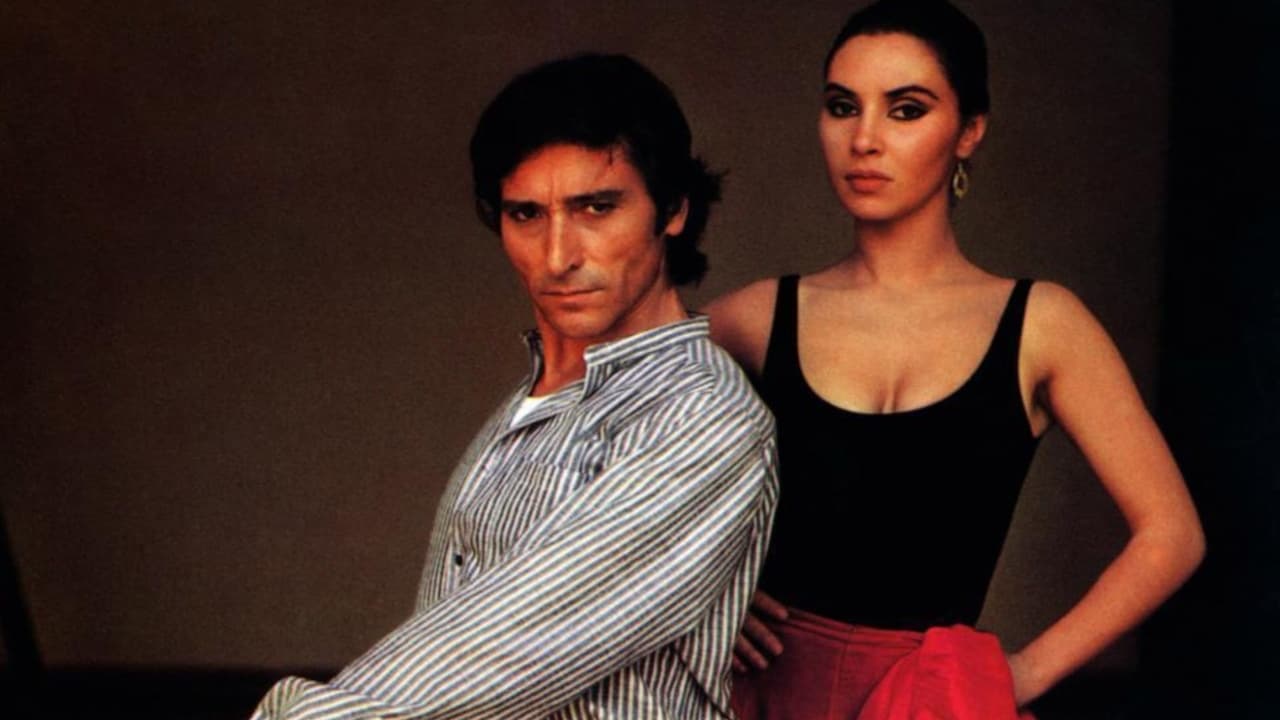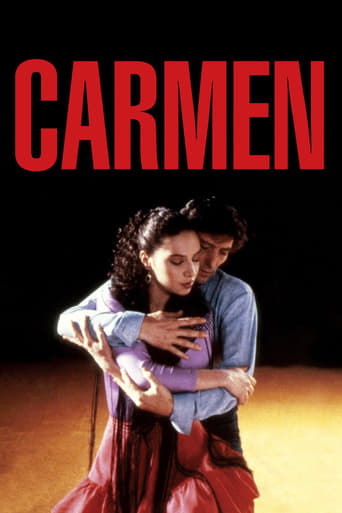

The amazing grace and power of flamenco has never been on more vigorous display than in Carlos Saura Carmen, the second of the Spanish director's flamenco trilogy that includes: Blood Wedding (1981), Carmen (1983), and El Amor Brujo (1986). Although the epitaph for movie musicals has now been written, there was never one more alive than this soaring dance interpretation of Bizet's opera based on the novella by Prosper Merimee. Winner of the BAFTA award for Best Foreign-language film and nominated for an Oscar in the same category, in Carmen, Saura attempts to expand the limited vision of the French opera into a deeper and more artistic example of Spain's national identity. Supported by performances by Spain's great guitarist Paco de Lucia and familiar songs by Bizet such as Toreador's March, La Habanera, and the lovely Intermezzo, the film bursts with energy and sensuality.Shot in Gades' dance studio in Madrid, the film is marked by riveting performances by Antonio Gades, former director of the National Ballet of Spain, Cristina Hoyos, an acclaimed flamenco dancer, and singer and dancer Laura del Sol in her first leading role. Carmen opens with the director of the dance company (Gades) rehearsing for a dance production of the opera. He is searching among his students for a young dancer to play the lead role but has not found one that suits his ideal. According to Gades, he wants a girl with "a wild and strange beauty, her lips full and well shaped, opening onto small teeth, whiter than the whitest pearls, her long, black, shiny hair with blue glints similar to a raven's feathers, and eyes with a voluptuous but surly expression." It is only when the director/choreographer travels to a similar studio in Seville that he finds his Carmen, played by the dark-haired del Sol. The film then moves seamlessly between the rehearsals of the company for its new production and the lives of the dancers, reflecting the story of the opera in an almost surreal way that blurs the distinction between illusion and reality. The teacher becomes personally involved with his student but finds that she is elusive, self-absorbed, and proud of her independence. When he discovers, however, that she is married and her husband has just been released from prison after serving a sentence on a drug-related charge, his possessiveness turns into a destructive jealousy that ends the film on a melodramatic tone.Some of the most memorable scenes in Carmen include Gades dancing the Ferucca in his own home as his lover sees him through his window, then, once inside, watches while he performs a full routine. Another remarkable sequence is the dance between Gades and Christina that depicts the male-female relationship with elegance and grace. Though the performance by del Sol captures Carmen's fiercely independent streak, for me she seems a bit too wholesome to be fully convincing as a jezebel, leaving the tragic resolution of the story feeling unmotivated. Whether or not you find the drama convincing, however, ultimately the film is not about the story but about the passion and breathtaking art of the dance. Carmen is a powerful experience that can evoke in the viewer an unexpected feeling of wonder
... View MoreThis did look like an interesting film and it absolutely was, not to mention that it was a brilliant movie in its own right. Visually, Carmen is stunning, with ravishing cinematography, sumptuous colour and costumes and costumes and scenery that are enough to take the breath away. The music is magnificent as well and performed with authentic flavour which makes the experience even more passionate. The choreography is very vivid and shows a big amount of technical, even virtuosic brilliance, while the Flamenco dancing is not only efficient but the dancers actually show they're into it. The story is still as beautiful and passionate as ever, while the performances of Antonio Gades and Laura De Sol are superb and the two are riveting together. Every scene is compelling, but my favourite is the Poker scene which is one of the better scenes of any film I've seen recently. In conclusion, a must watch. 9/10 Bethany Cox
... View MoreThis is an amazing film, both for the incredibly energy evoked from the frenetic flamenco dancing, and from the unique way that the filmmakers interweave the story of the stage production with the lives of the characters preparing for it. Spellbinding is the only word I can use to describe the experience. This is not 'Bizet's Carmen' by any usual standard. This is not a usual film by any standard. Every nuanced glance, every stomp of the foot, every piece of the music is intertwined so captivatingly that you can't take your eyes off the screen. You don't need to love opera or flamenco(I don't)to be captured, enraptured, enthralled by this film. Subtle and direct; loud and still; One of, if not the best, movies of it's kind, because there are so few like it.
... View Moregreat dancing, great music, great story. I saw it when it came out originally and dubbed into German, so my memory is a bit hazy, but it was very impressive. The story of the opera repeats itself in a production. All is shot very minimalistic, nearly just one set. It's stark, nearly monochrome and very intense because of that. Raw aggression and fury in the cigarette factory scene for instance. This one stands out most clearly in my memory 21 years after I've seen it.Guitar by Paco de Lucia, again very minimalist. I don't know whether there is a DVD available but I will start looking for one ;-)
... View More